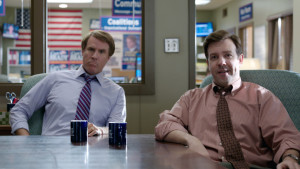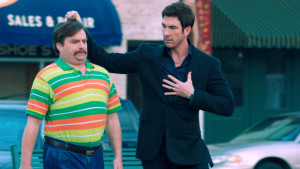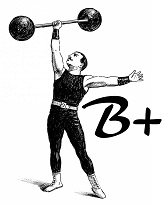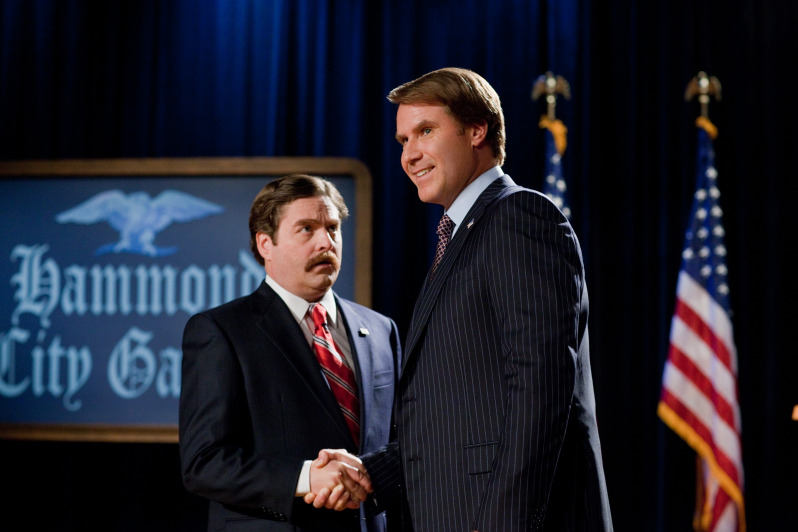Even the most unplugged, apolitical Americans are unable to avoid reportage on the upcoming presidential election these days, much as they might wish to be free of it. For the hardcore wonks and politics junkies, however, nothing is more compelling than the late-summer convention-time stretch every four years. In order to capitalize on the electoral frenzy, along comes political comedy film “The Campaign,” co-starring genre veterans Will Ferrell and Zach Galifianakis. While “The Campaign” approaches the American political landscape in decidedly uncontroversial terms – and thus squanders some juicy opportunities for satire – it contains just enough genuine laughs to please the election-obsessed and politically-agnostic alike.
Will Ferrell is Cam Brady, a suave, self-confident (if somewhat oblivious) North Carolina Congressman seeking his fifth consecutive term in Washington. Brady is running unopposed and can anticipate no possible hindrance to his reelection, until an errant, vulgar phone message exposes his philandering ways to his constituents. To capitalize on this sudden vulnerability, the corrupt and filthy-rich Motch brothers (obviously based on the infamous billionaire Koch brothers, and portrayed as cynical, unscrupulous profiteers by Dan Aykroyd and Jon Lithgow) search for an opposition candidate that they can control. In Brady’s tiny congressional district, their only option (after being forced to skip former collaborators now behind bars) is Marty Huggins (Galifianakis), the oddball son of an old associate.

Despite having run unopposed, Brady proves to know just how to play the game of politics, and humiliates Marty at their first public appearance as opponents. This forces the Motch brothers to install a seasoned campaign manager (Dylan McDermott) who isn’t afraid to play dirty. But when Marty learns that the Motch brothers (who have bankrolled his entire campaign) expect him to hand the district’s property to Chinese sweatshop operators after the election, he faces a difficult choice. For his part, Brady must confront his own desire to win the race without regard for the consequences.
The film’s brand of comedy is generally quite vulgar, with lots of crude sexual references, though it is somewhat tame by the standards of most R-rated American comedies. When it comes to the targets of its gags, no one is spared. While the two candidates’ respective party affiliations are explicit, neither is attacked on the content of policy or political ideals. By sidestepping any pointedly partisan commentary, the film manages to maintain broad appeal. Certainly, there is financial incentive to avoid alienating as much as half of the potential audience. The equal-opportunity mockery does serve another purpose, however: it highlights all of the ludicrously skewed components of the American political landscape.
 Objects of ridicule include the dubious art of crafting pithy, yet meaningless slogans (like Brady’s standby, “America, Jesus, and Freedom”), the not-so-factual content of political advertisements, and the rigid, team-oriented mentality that drives voters to blindly hate the opposition. While these are certainly legitimate targets, one can’t help but feel that the jokes are a little too safe. Even the villainous Motches, stand-ins for the post-Citizens United boogeymen, the Koch brothers, get off far too easy. Director Jay Roach certainly knows political theater (he directed the HBO films “Recount” and “Game Change,” covering the 2000 and 2008 elections respectively), but some misplaced sense of restraint keeps him from going for the jugular.
Objects of ridicule include the dubious art of crafting pithy, yet meaningless slogans (like Brady’s standby, “America, Jesus, and Freedom”), the not-so-factual content of political advertisements, and the rigid, team-oriented mentality that drives voters to blindly hate the opposition. While these are certainly legitimate targets, one can’t help but feel that the jokes are a little too safe. Even the villainous Motches, stand-ins for the post-Citizens United boogeymen, the Koch brothers, get off far too easy. Director Jay Roach certainly knows political theater (he directed the HBO films “Recount” and “Game Change,” covering the 2000 and 2008 elections respectively), but some misplaced sense of restraint keeps him from going for the jugular.
Fortunately, the two leads manage to keep the proceedings interesting via a series of entertaining vignettes. Will Ferrell’s work has been hit-or-miss for the past few years, but he is in vintage form, à la “Old School” (2003) and “Anchorman” (2004), as Cam Brady. He is at his best when allowed to ad-lib, as he does in one of the film’s funniest moments, when he drops his campaign manager in favor of promoting an intern, only to immediately fire, curse at, and physically attack the new manager when he has the audacity to suggest a substantive policy position. Galifianakis, for his part, is just as endearingly weird as his fans have come to expect. Marty’s high-pitched drawl and ever-present twin pugs make him as memorable as he is inscrutable.
On balance, “The Campaign” never rises to the level of great political comedies like “Wag the Dog” (1997) or “Election” (1999), but fans of the two leads will surely find enough to like here, even if they won’t care once November has come and gone.
– by Demian Morrisroe


